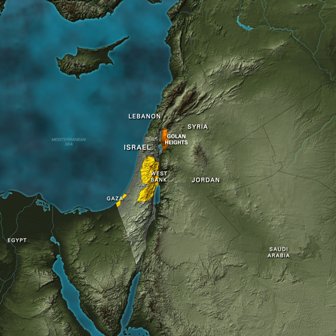 (CNN) -- A mortar shell fired from Syria landed Monday in the Golan Heights occupied by Israel, the second time in 24 hours fire originating from the war-torn country has shaken the area. Israel said it returned fire in the direction the shell came from.
(CNN) -- A mortar shell fired from Syria landed Monday in the Golan Heights occupied by Israel, the second time in 24 hours fire originating from the war-torn country has shaken the area. Israel said it returned fire in the direction the shell came from.
The Israeli Defense Forces and Syrian forces hadn't fired at each other in more than 40 years, so while the Israelis reported that there was no damage and no injuries, the latest fire portends how what's happening in Syria could seriously rattle the entire region.
The last time Israel fired on its neighbor across the Golan Heights was during the 1973 Yom Kippur War.
The Golan is regarded internationally as occupied territory despite Israeli governmental control. It is home to 41,000 residents, including Jews, Druze and Alawites. Israel seized the territory from Syria during the 1967 Israel-Arab war, and it was eventually annexed.
Israel is reacting to the mortars by filing a complaint with the United Nations forces operating in the area.
Fire coming from Syria into Israel "will not be tolerated and shall be responded to with severity," the complaint said, according to Israeli military sources.
Israeli Lt. Col. Avital Leibovich said she doesn't think the fire from Syria into Israel was intentional.
"We interpret it as ... leaks into Israel territory," she said. "It's totally internal conflict in Syria. We believe that Israel is not the target here. We are looking at either stray bullets or stray mortars."
But U.N. Secretary-General Ban Ki-Moon reacted with a statement Sunday saying he "is deeply concerned by the potential for escalation."
"He calls for the utmost restraint and urges Syria and Israel to uphold the Disengagement Agreement, respect their mutual obligations, and halt firing of any kind across the ceasefire line," the U.N. statement said.
Israel's ambassador to the United States, Michael Oren, told CNN Sunday that "a greater possibility" from the exchange of fire "is the inundation of refugees -- Christian, Druze, Alawites."
"We'd give them refuge," Oren said. "These are populations with which we have good relations. It's not unprecedented. We've been prepared for it for a long time but it hasn't happened."
Sunday's incident in the Golan Heights area is the fourth U.N. complaint Israel has filed. So far no one has been injured.
Syrian tanks entered the Golan Heights demilitarized zone last week and fired into Syria; bullets fired at the tanks in response struck an Israeli military vehicle in part of the Golan Heights that Israel claims as its own. Mortars also fell in part of the Golan that Israel considers its territory.
In other developments in Syria Monday --
Opposition forces come up with single plan
Syrian opposition factions formally agreed Sunday in Doha, Qatar, to unite as the National Coalition Forces of the Syrian Revolution, a spokesman for the Syrian National Council told CNN.
During the nearly two-year war in Syria, opposition forces have not had a unified vision for the country or single military plan to oust President Bashar al-Assad. So the United States and Arab nations have put pressure on the council to get the groups on the same page.
First, the group agreed that they want al-Assad gone and that no one would talk with his regime. The only option, they concluded, is a totally new government, spokesman Mohammed Dugham said.
SNC member Ahmed Muaz al-Khatib was selected chairman of the coalition. He is a former Sunni imam of the historic Ummayad mosque in Damascus. He has been detained at least three times since March 2011, most recently in April, according to a Facebook page created to promote his release. After his latest release he left the country, the page said.
The new vice presidents are Riad Seif, a prominent dissident and businessman from Damascus who served in the Syrian parliament as an independent, and Suhair Atassi, who is from a prominent Syrian family and is well-known for being outspoken against the government. She has also been an advocate for women's rights, calling the civil war a revolution for equality.
Al-Assad has his own group called the Syrian Human Rights Network. It accuses those who met to hashed the agreement -- and the countries who supported the meeting -- of sponsoring terrorism.
Al-Assad has consistently refused to acknowledge the civil war in Syria, saying repeatedly his government is fighting foreign-backed "terrorists" bent on destabilizing the nation.
Attacks across Syria
At least 40 people were killed across Syria Monday after 90 people were killed Sunday, the LCC reported.
More than 35,000 people are believed to have been killed in the fighting that began in March 2011, and more than 400,000 people have been displaced, according to opposition and U.N. estimates.
CNN's Kareem Khadder contributed to this report.
™ & © 2012 Cable News Network, Inc., a Time Warner Company. All rights reserved.
Portland and Seattle
Free Subscription to Breaking News
Free Subscription to Breaking News























































































































































































































































































































































